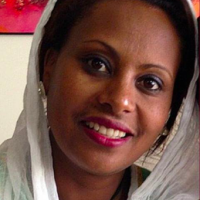Movies and stories can often act as catalysts to make a difference in the world we live in. They shed light on the untold stories of personal struggles and successes, inspiring audiences to strive for change.
Through the film Difret, we, the filmmakers and I, want to provoke large audiences to take action towards helping bring an end to child marriage. I myself was only 14 years old when I was kidnapped for marriage to a much older man. I was taken to an unfamiliar hut, locked inside, and raped. Unlike most children who share this horrible reality, I was able to escape by shooting my captor and running to safety. Even so, I wasn't free. I was charged with murder and brought to trial. Fortunately, I had an incredible and supportive team behind me, who worked tirelessly for my justice.
After the court case victory, I was still exiled to leave my village because of what happened. So even though I won, I had a hard life. I was not allowed to return and live with my family. So I thought it was better to remain hidden than be public. But the film has changed that. I am thankful that it has made my story visible for others and I have been encouraged by the positive response.
However, Difret is not just my story—it is the story of all of the Ethiopian women who joined forces to break free from harmful traditions and cultural norms. The film has been a powerful opportunity for me to vocalize my experience to help protect and embolden girls all around the world. Moreover, it serves as a chance to encourage these girls to unite and empower each other.
I hope that the film motivates others to take courageous actions both in Ethiopia and across the globe, helping to bring an end to child marriage and violence against women.
Starting this year, inspired by the powerful effect of the film and seeing what women can accomplish when they have a common goal, I'm beginning my journey as an activist to eliminate child marriage. I am determined to support the women and girls in rural Ethiopia, to share with them my experience, and to enable them to stand strong in the face of challenges and discrimination.
I have already taken my first step, acting as an advocate for girls everywhere. With the incredible support of our the film’s outreach partners: Global Fund for Women, Equality Now, Ms magazine, and Change.org, we launched a petition urging the U.S. State Department to deliver the adolescent girls strategy which includes a plan for ending child marriage. Advocates around the world have been waiting for this strategy since 2013 when it was promised. We delivered the petition, which had over 144,000 signatures, a few weeks ago to the Department State at the inaugural Women and Foreign Policy convening series that Ambassador Catherine Russell hosted. I was not able to attend the delivery because of the recent birth of my daughter but the producer of the film was able to share some comments on my behalf and deliver the signatures.
This was my first public action as an advocate and it felt great to be supported by so many people around the world who believe in ending child marriage. I plan to do more as an activist. I think too often women like me are portrayed as victims, and the truth is we are not—we have powerful voices that we can use for ourselves to achieve change. So, my main goal is to start using my voice and my story to help change things for other women and girls. I want to bring awareness to the issue of child marriage and the ways in which it robs young women from leading a life of their own choosing. Because of the film Difret, I know I have an opportunity to reach millions of people with my story, even beyond Ethiopia, and I want to use this chance to help advocate for this issue.
I am working on these issues in Ethiopia and I want to help others working in different countries around the world to do the same. As the film prepares for release in the United States this October, I'm excited to be standing with the filmmakers and our partners, and girls all over the world to help to eradicate the issue of child marriage and raise awareness about the violent circumstances that often accompany it. There is a great deal of work still to do and I have started my own foundation, Women for Women Social and Development Association, to help do this work. My foundation will work on a range of gender equality issues with the goal of encouraging, supporting, protecting, and promoting women and girls. More specifically, the association will provide technical and financial support to community based organizations and local government entities that work on the social and economic problems of women and girls in Ethiopia.
In closing, my court case changed many things. There were no more abductions in my village for an almost 10-year period. The laws were also strengthened—abduction became punishable with a prison sentence of five years or more. The legal code also recognized gender-based violence as a crime for the first time in Ethiopian history. But now, abduction is on the rise again in my village and there is much work to do.






